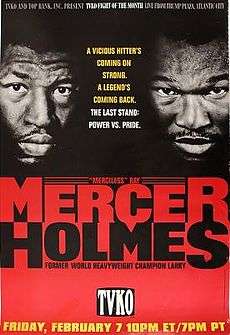Ray Mercer vs. Larry Holmes
| "The Last Stand" | ||||||||||||||||||||||||||||
|---|---|---|---|---|---|---|---|---|---|---|---|---|---|---|---|---|---|---|---|---|---|---|---|---|---|---|---|---|
 | ||||||||||||||||||||||||||||
| Date | February 7, 1992 | |||||||||||||||||||||||||||
| Location | Convention Center in Atlantic City, New Jersey | |||||||||||||||||||||||||||
| Title(s) on the line | None | |||||||||||||||||||||||||||
| Tale of the tape | ||||||||||||||||||||||||||||
| ||||||||||||||||||||||||||||
Ray Mercer vs. Larry Holmes, billed as "The Last Stand", was a professional boxing match contested on February 7, 1992.
Background
The previous year was a good one for the undefeated Olympic Gold Medalist Ray Mercer. He started the year off by defeating the previously undefeated Francesco Damiani to capture the WBO Heavyweight title. Following that victory, Mercer was matched up against another undefeated fighter in Tommy Morrison for what would be the first and only defense of his WBO title. Morrison outboxed Mercer for the first three rounds, but Mercer came back strong in the fourth round and proceeded to knock out Morrison in brutal fashion 28 seconds into the fifth. The victory made Mercer one of the top contenders in the heavyweight division and he quickly vacated the less-regarded WBO title in order to face 42-year-old ex-heavyweight champion Larry Holmes in a match to determine who would next meet Evander Holyfield for the Undisputed Heavyweight Championship. Holmes had twice retired, first after failing to recapture his IBF title in a 1986 rematch with Michael Spinks, and then again after being dominated for four rounds in a 1988 fight with Mike Tyson for Tyson's undisputed title. In April 1991, Holmes launched a comeback[1] and he proceeded to defeat five unknowns through the course of the year before agreeing to face Mercer in February 1992. Holmes was given little chance to defeat Mercer and came into the fight as a 4–1 underdog. Mercer and his team looked at the fight as a "springboard" to gain Mercer more marketability. Holmes, however, remained confident that he could defeat Mercer and vowed that he would retire for the final time should he lose.[2]
The Fight
Through the early portion of the fight, Mercer and Holmes were both aggressive and traded punches, though Mercer was able to land his punches more effectively and at a higher frequency. Mercer continued to be the aggressor in the second round and spent most of the round on the attack. Towards the end of the round, Holmes stood with his back against one of the corners and was able to land a few right hands to Mercer's head while using that strategy. By the third round, Holmes had fully embraced the defensive strategy and continued to fight with his back against the ropes for the remainder of the fight. Mercer would continue to attack Holmes in the corner with several combinations, but Holmes would counter with some combinations of his own. In the fourth, Holmes would circle around Mercer in an effort to pace himself and not burn himself out by trading punches with the younger and stronger Mercer. Holmes then spent almost the entire fifth round with his back against the corner where he landed some good shots on Mercer, who by then seemed to have tired of Holmes unorthodox strategy and was not landing as much as he had in the earlier rounds. Mercer would continue to struggle with Holmes' defense for the rest of the fight and by the later rounds, was seemingly more fatigued then Holmes. The fight went the full 12 rounds with neither man picking up a knockdown. As such, the fight went to the scorecards, and with scores of 117–112, 117–111 and 115–113, Larry Holmes was declared the winner by unanimous decision.[3][4]
Holmes later claimed that he had fought Mercer in spite of having a detached retina.[5]
Aftermath
Holmes parlayed his upset victory over Mercer into a Undisputed title shot at Evander Holyfield, which was made official only a month after his victory with a date set for June 19, 1992.[6] Holmes used a similar approach in his match with Holyfield as he did with Mercer, taking a more defensive stance by positioning himself against the ropes and inviting Holyfield to throw punches, with Holmes hoping that Holyfield would tire himself as the fight went on. However, unlike Mercer, Holyfield would not get fatigued and continued to attack Holmes for the duration of the fight. Holmes simply was unable to sustain much offense and lost by a relatively lopsided unanimous decision.[7]
Ray Mercer returned from his defeat to win his next two fights and eventually earned another chance at receiving a World title shot when he agreed to meet WBA/IBF champion Riddick Bowe. In what was supposed to be a tuneup before his title match with Bowe, Mercer fought journeyman Jesse Ferguson on February 6, 1993 on the undercard of the Riddick Bowe–Michael Dokes championship fight. However, Ferguson dominated Mercer, winning easily by unanimous decision, taking Mercer's title shot with Bowe in the process. Adding to Mercer's problems was the fact that after his loss, Ferguson revealed that Mercer had bribed him with $100,000 to take a dive knowing that he was well behind Ferguson on the scorecards and a loss would cost him his title shot.[8]
References
- ↑ Larry Holmes Starts Comeback On Sunday, Morning Call article, 1991-04-05, Retrieved on 2013-08-05
- ↑ Seeking Marquee Status, Mercer Set To Fight Holmes, Philadelphia Inquirer article, 1992-02-07, Retrieved on 2013-08-05
- ↑ Holmes Defeats Mercer by Decision, N.Y. Times article, 1992-02-08, Retrieved on 2013-08-05
- ↑ Grandfather Holmes Wins Decision, Earns Respect, Seattle Times article, 1992-02-08, Retrieved on 2013-08-05
- ↑ http://articles.latimes.com/1992-12-30/sports/sp-2553_1_larry-holmes
- ↑ Match Is Made Official Holmes Getting Shot At Holyfield, Philadelphia Inquirer article, 1992-03-06, Retrieved on 2013-08-05
- ↑ It Wasn't Pretty, but Holyfield Still Retains Title, N.Y. Times article, 1992-06-20, Retrieved on 2013-08-05
- ↑ Mercer Charged With Offering Ferguson a Bribe During Bout, Philadelphia Inquirer article, 1993-06-30, Retrieved on 2013-08-05